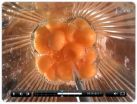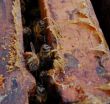(Press-News.org) A team of international scientists working in the central Pacific have discovered that coral which has survived heat stress in the past is more likely to survive it in the future.
The study, published today in the journal PLoS ONE, paves the way towards an important road map on the impacts of ocean warming, and will help scientists identify the habitats and locations where coral reefs are more likely to adapt to climate change.
"We're starting to identify the types of reef environments where corals are more likely to persist in the future," says study co-author Simon Donner, an assistant professor in UBC's Department of Geography and organizer of the field expedition. "The new data is critical for predicting the future for coral reefs, and for planning how society will cope in that future."
When water temperatures get too hot, the tiny algae that provides coral with its colour and major food source is expelled. This phenomenon, called coral bleaching, can lead to the death of corals.
With sea temperatures in the tropics forecast to rise by 1-3 degrees Celsius by the end of the century, the researchers say coral reefs may be better able to withstand the expected rise in temperature in locations where heat stress is naturally more common. This will benefit the millions of people worldwide who rely on coral reefs for sustenance and livelihoods, they say.
"Until recently, it was widely assumed that coral would bleach and die off worldwide as the oceans warm due to climate change," says lead author Jessica Carilli, a post-doctoral fellow in Australian Nuclear Science and Technology Organisation's (ANSTO) Institute for Environmental Research. "This would have very serious consequences, as loss of live coral – already observed in parts of the world – directly reduces fish habitats and the shoreline protection reefs provide from storms."
Caralli and Donner conducted the study in May 2010 in the Pacific island nation of Kiribati, near the equator. Kiribati's climate is useful for testing theories about past climate experience because its corals are pounded by El Niño-driven heat waves, while corals on the islands farther from the equator are less affected.
The researchers analyzed coral skeletal growth rates and tissue fat stores to compare how corals from different regions responded to two recent coral bleaching events in 2004 and 2009.
Donner has conducted field research in Kiribati since 2005 and will return this year to conduct follow-up research with the local government. He says the findings suggest that Marine Protected Areas – conservation areas designed to protect marine life from stressors like fishing – may be more effective in areas with naturally variable water temperatures
The research delivers mixed news for Australia's Great Barrier Reef, because the reef stretches over such massive distances; some areas have stable temperatures and some do not. The findings support previous laboratory and observational studies from other regions, suggesting they can be widely applied.
Planning is now underway for potential future studies of coral in areas of the world that have not experienced significant historical changes in water temperatures.
"Even through the warming of our oceans is already occurring, these findings give hope that coral that has previously withstood anomalously warm water events may do so again," says Carilli. "While more research is needed, this appears to be good news for the future of coral reefs in a warming climate."
### END
Some corals like it hot: Heat stress may help coral reefs survive climate change
2012-04-02
ELSE PRESS RELEASES FROM THIS DATE:
The electronic nose knows when your cantaloupe is ripe
2012-04-02
Have you ever been disappointed by a cantaloupe from the grocery store? Too ripe? Not ripe enough? Luckily for you, researchers from the University of California, Davis might have found a way to make imperfectly ripe fruit a thing of the past. The method will be published on March 30 in the Journal of Visualized Experiments (JoVE).
"We are involved in a project geared towards developing rapid methods to evaluate ripeness and flavour of fruits," said paper-author Dr. Florence Negre-Zkharov. "We evaluated an electronic nose to see if it can differentiate maturity of fruit, ...
The link between fast food and depression has been confirmed
2012-04-02
According to a recent study headed by scientists from the University of Las Palmas de Gran Canaria and the University of Granada, eating commercial baked goods (fairy cakes, croissants, doughnuts, etc.) and fast food (hamburgers, hotdogs and pizza) is linked to depression.
Published in the Public Health Nutrition journal, the results reveal that consumers of fast food, compared to those who eat little or none, are 51% more likely to develop depression.
Furthermore, a dose-response relationship was observed. In other words this means that "the more fast food you consume, ...
ADHD is over-diagnosed
2012-04-02
What experts and the public have already long suspected is now supported by representative data collected by researchers at Ruhr-Universität Bochum (RUB) and University of Basel: ADHD, attention deficit hyperactivity disorder, is over-diagnosed. The study showed that child and adolescent psychotherapists and psychiatrists tend to give a diagnosis based on heuristics, unclear rules of thumb, rather than adhering to recognized diagnostic criteria. Boys in particular are substantially more often misdiagnosed compared to girls. These are the most important results of a study ...
Whether grasping Easter eggs or glass bottles – this robotic hand uses tact
2012-04-02
It may be difficult to imagine, but pouring juice into a plastic cup can be a great challenge to a robot. While one hand holds the glass bottle firmly, the other one must gently grasp the cup. Researchers at Saarland University together with associates in Bologna and Naples have developed a robotic hand that can accomplish both tasks with ease and yet including the actuators is scarcely larger than a human arm. This was made possible by a novel string actuator, making use of small electric motors to twist strings. The robotic hand is thus powerful yet delicate and could ...
Intec Controls Inc. Selects SAP Business One from ProjectLine Solutions as its Integrated Business Management Solution to Propel Growth
2012-04-02
ProjectLine Solutions Inc. (www.projectline.ca), a leading provider of business enterprise and software solutions for small and mid-sized businesses, announces Intec Controls Inc. as one of its newest customers implementing the SAP Business One application. With offices across Western Canada, ProjectLine Solutions will be completing the implementation from its Saskatoon, SK office.
Based in Saskatoon, Intec Controls Inc. (www.inteccontrols.ca) represents a number of leading product lines in Saskatchewan and Manitoba from globally recognized manufacturers. In addition ...
Bees 'self-medicate' when infected with some pathogens
2012-04-02
Research from North Carolina State University shows that honey bees "self-medicate" when their colony is infected with a harmful fungus, bringing in increased amounts of antifungal plant resins to ward off the pathogen.
"The colony is willing to expend the energy and effort of its worker bees to collect these resins," says Dr. Michael Simone-Finstrom, a postdoctoral research scholar in NC State's Department of Entomology and lead author of a paper describing the research. "So, clearly this behavior has evolved because the benefit to the colony exceeds the cost."
Wild ...
Extreme weather threatens rich ecosystems
2012-04-02
Extreme weather such as hurricanes, torrential downpours and droughts will become more frequent in pace with global warming. Consequently, this increases the risk for species extinction, especially in bio diverse ecosystems such as coral reefs and tropical rainforests.
Human impact means that flora and fauna become extinct at a rate 100 times higher than normal. Climate change has been deemed as one of the main causes of species depletion.
A research team in theoretical biology at Linköping University in Sweden has, through the use of mathematical modelling and simulation, ...
IOM report identifies public health actions for improving the lives of those with epilepsy
2012-04-02
WASHINGTON — An estimated 2.2 million people in the United States live with epilepsy, a complex brain disorder characterized by sudden and often unpredictable seizures. The highest rate of onset occurs in children and older adults, and it affects people of all ethnicities and socio-economic backgrounds, yet this common disorder is widely misunderstood. Epilepsy refers to a spectrum of disorders with seizures that vary in type, cause, severity, and frequency. Many people do not know the causes of epilepsy or what measures to take if they witness a seizure. A new report ...
Honeycombs of magnets could lead to new type of computer processing
2012-04-02
Scientists have taken an important step forward in developing a new material using nano-sized magnets that could ultimately lead to new types of electronic devices, with greater capacity than is currently feasible, in a study published today in the journal Science.
Many modern data storage devices, like hard disk drives, rely on the ability to manipulate the properties of tiny individual magnetic sections, but their overall design is limited by the way these magnetic 'domains' interact when they are close together.
Now, researchers from Imperial College London have ...
Declines in Caribbean coral reefs pre-date damage resulting from climate change
2012-04-02
The decline of Caribbean coral reefs has been linked to the recent effects of human-induced climate change. However, new research led by scientists at Scripps Institution of Oceanography at UC San Diego suggests an even earlier cause. The bad news – humans are still to blame. The good news – relatively simple policy changes can hinder further coral reef decline.
Employing a novel excavation technique to reconstruct the timeline of historical change in coral reefs located on the Caribbean side of Panama, a team of scientists led by Scripps alumna Katie Cramer and current ...



